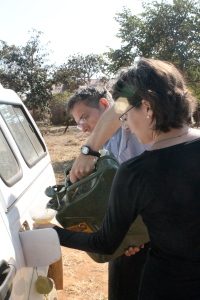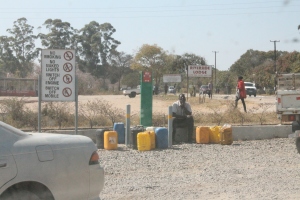I’m wearing trousers right now. No skirt, no chitenge (okay, yes chitenge, but I’m wearing it as a shawl because there’s a lot of air-conditioning and I’m cold. Use #24 again), just a pair of jeans.
I don’t know how many of you are aware of this, but it’s been over a year since I last went outside my house without a skirt.* In rural Zambia, women and trousers is . . . an interesting question. Women do wear them, especially young women, but I never saw an older woman in trousers, and even for young women it was usually pretty rare. No one would have said anything if I’d worn them, but it was optimally culturally correct to wear skirts, so I did.
When I got back from Zambia, I’d already gone almost 11 skirted months, and a year seemed a nice round number, and not that far away, so I went for it, just to be able to say I did. And now I have.
It was a bit odd, this morning, pulling my legs into a garment with legs, and then not putting anything over it (there were a few weeks where it was cold enough that I did wear trousers under a skirt, just for the warmth). Trousers fit and hug your legs in a way that skirts don’t, at least not the sort of skirts I wear. But perhaps what I found most surprising is how natural it feels to be back in trousers. I expected going out without a skirt to be like the end of the Spoon Assassins game I played in college, where it took an effort of will to walk outside my room without my spoon, because I felt naked without it. I guess absence of trousers is something I notice less than presence of spoon, and that even a year wearing skirts does not erase social norms formed over a lifetime, particularly since I wear a lot of skirts anyway.
But let me tell you, the pockets are really nice.
—————-
I had a request to tell about being threatened with arrest.
I’m fairly sure I mentioned our persistent work permit difficulties. The first instance of threatened-with-arrest is really Matt’s story, because he’s the one who rushed to the immigration office when we realized there was a problem, and took the heat and the arrest threats, so that when Chris and I came in a day or two later, no-one even batted an eye at our two-months-overdue visas. Matt said they threatened to arrest Chris and I, but since neither of us were there at the time, I don’t feel that that one really counts.
Fast-forward eight months, to the end of June. I had shown up at the immigration office in Choma every sixty days or so, to get my 90-day visa renewed for another 60 days, since my work permit was technically approved, I just didn’t have it. I was going down to Livingstone to see Mosi-oa-Tunya one last time, and also meet Chris’s family. My visa — I still did not have my work permit — needed to be renewed again.
What with one thing and another, I wound up waiting at the Choma bus station for several hours, because Matt hadn’t bought tickets beforehand, and I completely mis-read Chris’s next message, and . . . So I did a couple of errands for Matt in town. I did think about walking down to immigration (a bit of a hike) to get my visa renewed, but it was Friday, and the visa didn’t come due until Wednesday of the next week, and you’re not supposed to go too early, and I wasn’t sure when Matt was showing up, and my the time I realized that it would’ve been a good time to go, it was too late to. And after all, I would be coming back the other way on Monday and could do it then.
Only . . . Monday was Heroes’ Day. Tuesday was Unity Day. Neither of these were days upon which immigration was open. And this did not occur to me until later that weekend, partly because I’d been talking to someone who thought Thursday and Friday were the holidays in the upcoming week, not Monday and Tuesday (and by that point I wasn’t teaching anymore, so I was keeping a much less firm grasp upon schedules and holidays and things, since tutoring required less preparation and did not start as early in the morning).
On Tuesday, the other family got back from their own trip to Livingstone, also having failed to renew their visas (which all came due at the same time, since we’d all gone together the previous time, so I could show them the location of the Immigration Office). And they would be leaving for a workshop on the other side of Choma on Thursday, and did not feel that they needed to drive from Livingstone on Tuesday, go back to Choma on Wednesday, leave again on Thursday, and get back on Friday. Especially since there was a petrol shortage. Especially-especially since, as a result of the petrol shortage, they had not managed to get fuel on Tuesday, and, in fact, would need to dip into their reserve petrol in order to get to Choma at all.
So we were discussing this Tuesday afternoon. I’d been planning to take the minibus to town on Wednesday, which was an unfortunate waste of a day just to get a stamp on my passport, but seemed especially useless when there would definitely need to be an MCC vehicle traveling to Choma on Wednesday, somehow or other. Only the MCCers affiliated with said vehicle did not wish to go. Only the MCCers affiliated with said vehicle needed to go. It was a conundrum.
And THAT’s when I had my brilliant moment of inspiration. I turned to Natasha. “You have Mr. Robert Phiri’s telephone number.”
“What?”
“The Immigration official. You have his telephone number.”
I knew she had his telephone number, because the last time I’d been there, I’d poked my head back in the office, just as we were leaving, and asked what his name was, since it did not seem fitting that he’d been unfailingly nice to me for most of a year (visas are only supposed to be extended 30 days, but I’d never gotten fewer than 60), and I did not even know his name.
He told me, and asked for my telephone number, which I did not give him (“I’m afraid I don’t know what it is”), because there was no reason he needed my telephone number, and I don’t give my number out to people who have no reason to need it, especially not in Zambia. (The man is old enough to be my father, and I don’t think that was an Advance, just . . . the weird-usual friendliness when interacting with white people. But he didn’t need my phone number.) So he wrote down his, on a little slip of paper, along with his name, and gave it to me.
I gave it to Natasha, because I was almost done in Zambia, and she would still be there most of a year.
“You wrote it down in your notebook with the other Immigration information.”
“OH!”
Sure enough, there it was.
They made me call, because they were convinced that I have the Choma Immigration officials, like the Choma police, wrapped around my little finger, something that I am still dubious of (especially the police).
We were having cell network problems at the time, so it took about 20 tries before I got through, but eventually I did.
I’m not at all sure that he knew who I was (there are a lot of people in the Choma area who go to Immigration, you know?), but he was friendly and willing to be persuaded. When I suggested that we could perhaps not come in until the day after our visas came due, he threatened me (all three of us, actually) with arrest, but then asked if Thursday was when I could get transport, and I said yes, and he made me promise promise PROMISE to definitely come in on Thursday, and said it would be okay. (I am still not at all sure if he’s a nice guy and being extra-nice because I asked, or if they really just don’t care at all.)
So I felt pretty proud of myself, first for remembering that we had the number, and second for pulling it off, and Ingo and Natasha are even more convinced that I can bend all government officials in Choma to my will with a single word. (Are you folks still reading this? I bet they’re nice to you now that I’m gone, too.)
We arrived in town . . . not without adventures. With no more adventures than usual.

The usual culprits. That funnel is made from the top of a Zamanita Oil bottle, part of a bicycle inner tube, and some string.
Everything went just fine in the Immigration office. No one even commented on the day-late thing. We got to see a work permit, unfortunately not mine. (They look like little passports. I still WANT one, drat it!) I brought them biscuits as a thank-you/goodbye. (It was not a bribe. I gave it to them after, and I wasn’t going to interact with them probably ever, anyway.) I even found two new foods I hadn’t eaten on the way out.

Tuyumu (top) and freshis (bottom). Tuyumu are a sectioned . . . fruit/nut/thing, where you throw out the seeds and chew the woody divider inside the pod. It tastes very much like dates, and foams up into a sticky goo that makes them very difficult to spit out later. Tasty, but lots of work. Freshi are soft and squishy, with a small seed like a cherry pit inside (for scale, tuyumu are a little bigger than cherries. Maybe the size of limes). They taste like dried apricots. Wet and juicy dried apricots.
And, when we stopped to get petrol, we learned that a truck had just come through the night before to fill up several of the petrol stations, and that it was a good thing we hadn’t come the day before, because we didn’t have enough petrol to get the vehicle home again, and we wouldn’t have been able to get any in town. The lines at the petrol stations were only about six cars long, which was quite reasonable, considering.
I took the minibus home, my last ride (to date) on a Zambian minibus.
This post brought to you by Mr. Robert Phiri, Lemon Creme biscuits, and the Puma station in Choma, on the Lusaka-Livingstone road.
————
*I have worn a bathing suit on perhaps three occasions. But mostly only while in the pool.









